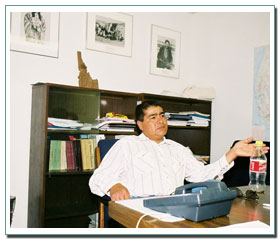
Shoshone-Paiute enjoy remotness of rez
Morgan
Winsor
Fish
increase through enhancement projectsGibson follows in footsteps of his late father
Thomas teaches others importance of vision, purpose
helps shape culture
| By
Kathrin Podbrecnik Partly in Idaho, partly in Nevada – the Duck Valley Indian Reservation of the Shoshone-Paiute tribe lies right on the border between two states. Like an ironic remark, the reservation’s geographic location alludes to the tribal members lives torn between two very different worlds: Native American culture versus American lifestyle – a fate that the tribe in Duck Valley shares with most Native Americans throughout the country. Tribal member Reggie Sope has taken the lifetime responsibility of protecting Native American beliefs and values from the tempting influence of the American way of life. Chosen by elders to pass on the culture of his people to the next generation, he attaches importance to maintaining aboriginal customs in order to ensure the appropriate way of life for the members of his tribe. A large part of the Native American way of life is shaped by a close relationship to nature, he said. Native Americans do not live against but with their environment. Since the Maker has put a spirit in everything – every stone, tree or animal – Native Americans say a prayer before they take anything with them. Water plays a key role for them because it is the most important thing in life. Therefore, hot springs are considered as birthplaces with an especially powerful spirit. It is a humble way of life in a culture where humans do not play the most important part in nature, he said. In fact, according to many Native American beliefs, humans were created after anything else. They are just one part of the circle of life and have to respect everything around them because it was there before them. Native Americans are taught to be thankful for everything that happens in their lives, even for things that don’t seem to be positive at first sight: if your hat is blown away by the wind and you have to run after it, thank the Maker instead of swearing about your bad luck, Sope said. "It might have saved your life because there is a reason for everything." Other big parts of Native American culture are traditional ceremonies and dances, for example the Ghost Dance that is destined to honor the spirits. The Sun Dance not only strengthens the dancers’ faith by improving their spiritual condition, it also helps to clean and refresh body and mind. Participants of the Sun Dance sacrifice any food or drink for four days of dancing. |
In Duck Valley, these ceremonies still exist, but despite Sope’s efforts to maintain Native American values on the reservation, the American way of life threatens to become rampant. He said the number of tribal members suffering from cancer or diabetes increases annually, and especially young people need more and more guidance in their lives. Sope assumes to know the reasons for the spread of physical and mental inflictions in the reservation. The intake of medications instead of natural remedies or the jet activity of the nearby Air Force Base – in short, the abundance of American aspects in their lives – might contribute to the Native Americans’ bad living conditions. But above all, there is one key factor that has a bad influence on the Native Americans in Duck Valley: it’s the life of being torn between two sides, the inherited aboriginal world and the growing American world. |
||||||||
|
|||||||||
